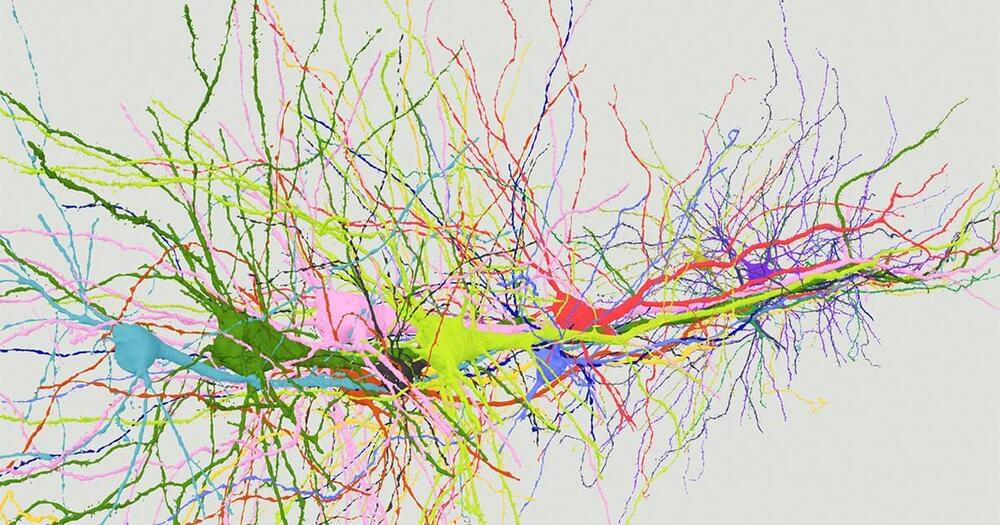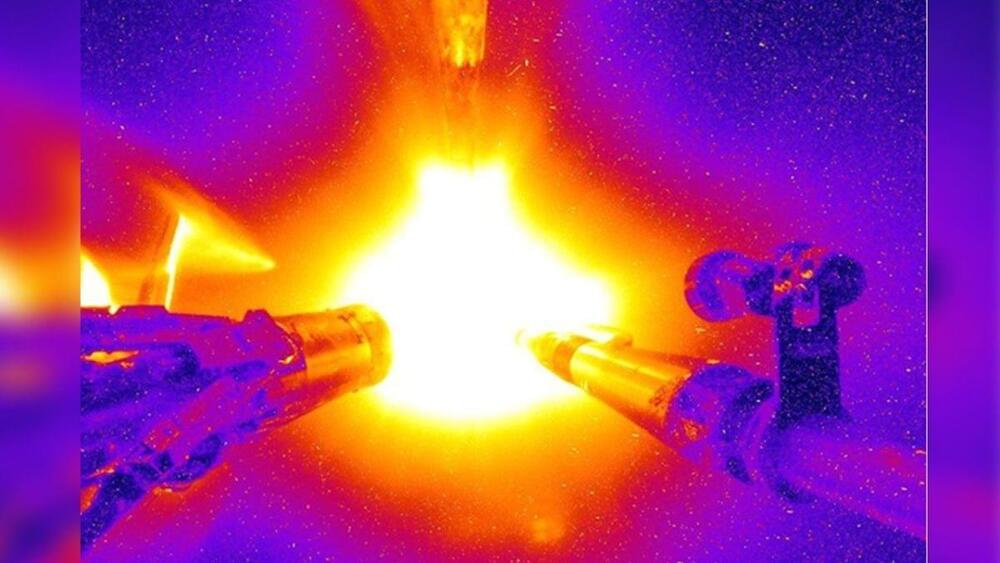Rapid advances in large-scale connectomics are beginning to spotlight the importance of individual variations in the neural circuitry. They also highlight the limitations of “wiring diagrams” alone.




An international team of astronomers led by researchers from the Netherlands has found no trace of dark matter in the galaxy AGC 114,905, despite taking detailed measurements over a course of forty hours with state-of-the-art telescopes. They will present their findings in Monthly Notices of the Royal Astronomical Society.
When Pavel Mancera Piña (University of Groningen and ASTRON, the Netherlands) and his colleagues discovered six galaxies with little to no dark matter, they were told “measure again, you’ll see that there will be dark matter around your galaxy.” However, after forty hours of detailed observations using the Very Large Array (VLA) in New Mexico (United States), the evidence for a dark matter-free galaxy only became stronger.
The galaxy in question, AGC 114,905, is about 250 million light-years away. It is classified as an ultra-diffuse dwarf galaxy, with the name ‘dwarf galaxy’ referring to its luminosity and not to its size. The galaxy is about the size of our own Milky Way but contains a thousand times fewer stars. The prevailing idea is that all galaxies, and certainly ultra-diffuse dwarf galaxies, can only exist if they are held together by dark matter.

If someone told you that the world’s biggest laser was in California that has something to do with space and national defence, you might imagine it was a super-weapon designed to blast enemy satellites out of the sky. But the reality is quite different. The new laser is a unique research tool for scientists, capable of creating the extreme conditions that exist inside stars and nuclear explosions.
The giant laser is located at the Lawrence Livermore National Laboratory (LLNL) in Livermore, California, and it goes by the rather cryptic name of the National Ignition Facility (NIF). That’s because, in the context of nuclear science, “ignition” has a very specific meaning according to the Lawrence Livermore National Laboratory. It refers to the point at which a fusion reaction becomes self-sustaining – a condition that is found inside the sun and other stars, but is extremely difficult to achieve in an earthbound laboratory. Triggering nuclear fusion requires enormously high temperatures and pressures, and that’s where NIF’s giant laser comes in.

Theoretical physicist Sean Carroll joins us to discuss whether it make sense to think of consciousness as an emergent phenomenon, and whether contemporary physics points in this direction.
We discussed Sean’s essay responding to Philip’s book ‘Galileo’s Error,’ and Philip’s counter-response essay. Both are available here: https://conscienceandconsciousness.com/2021/08/01/19-essays-on-galileos-error/
We also discussed Philip’s Scientific American article making the case that the move from the fine-tuning to the multiverse commits the ‘inverse gambler’s fallacy’: https://www.scientificamerican.com/article/our-improbable-ex…20we%20are, with%20the%20existence%20of%20life.
Finally, Keith and Philip discussed the PhilPapers 2020 survey of philosophers’ opinions on philosophical questions, which is linked to from this blog post of Philip’s: https://conscienceandconsciousness.com/2021/11/01/materialis…only-just/

I think his purpose in doing this is to prioritize full self driving over partial self driving features.
“Humans drive with eyes and biological neural nets,” Musk said in October. “So [it] makes sense that cameras and silicon neural nets are [the] only way to achieve generalized solution to self-driving.”
Moreover, he’s reportedly implementing that philosophy at Tesla.
Musk has repeatedly instructed the company’s Autopilot team, which works on self-driving car tech, to ditch radar and use only cameras instead, the New York Times reported on Monday.

A scientist who loves to write, can do it well, and can share the excitement of the scientific pursuit is incredibly rare. Kevin Peter Hand 0, Deputy Project Scientist, Europa and Director of the JPL Ocean Worlds Lab is that rare person who can do all these things. In his incredible book Alien Oceans: The Search for Life in the Depths of Space 0, he explains that “We know that the laws of physics, the principles of chemistry, and the principles of geology all work beyond Earth. We’ve explored other worlds and observed that these sciences are universal. When it comes to biology, however, we have yet to make that leap.”
If you want to learn about how the intersection of numerous areas of science are helping inform our understanding of the oceans, space, and ourselves, Alien Oceans is by far one of the most clearly written books on the topic. As Kevin notes, he wrote the book he wishes he could have read in college. Kevin will teach you and inspire you and explain complicated scientific topics in ways nearly anyone can understand. Not only is it a book about his areas of expertise, it is also a wonderful window into the way scientists and engineers think about solving real world problems and applying basic knowledge. For example, Kevin notes in this interview that “Making measurements is where the creativity of science meets the hard reality of engineering.” I read a lot of books on science written for a broad audience, and this book, by far is among the very best I have ever read. More than anything else what came through in Kevin’s writing is excitement about finding out what is true.
What inspired you to write this book?

No multi-billion-dollar acquisitions occurred in the world of AI chips in 2021.
Instead, the leading AI chip startups all raised rounds at multi-billion-dollar valuations, making clear that they aspire not to get acquired but to become large standalone public companies.
In our predictions last December, we identified three startups in particular as likely acquisition targets. Of these: SambaNova raised a $670 million Series D at a $5 billion valuation in April; Cerebras raised a $250 million Series F at a $4 billion valuation last month; and Graphcore raised $220 million at a valuation close to $3 billion amid rumors of an upcoming IPO.
Other top AI chip startups like Groq and Untether AI also raised big funding rounds in 2021.
Full Story:
As of the beginning of this year, no autonomous vehicle company had ever gone public. 2021 is the year that that all changed.

A Martian asteroid-like moon appears to be making waves in the stream of particles the sun sends across the universe. From space, a European Space Agency spacecraft did an experiment to confirm a weird effect first observed at the moon, which is called Phobos, in 2008. The Mars Express spacecraft noticed Phobos “backscattering” or reflecting solar particles during one flyby, but has been unable to spot this again despite zooming by the moon several more times over the years.
Scientists thought they saw more backscattering during a 2016 flyby, but the position of Mars Express at that time led to another hypothesis: maybe the spacecraft itself had caused the effect. So this led to another weird trick: why not do some “fake” flybys of the moon to see if the spacecraft can induce backscattering on another world?
That led to a fun sequence in 2017, the European Space Agency stated, when Mars Express replicated the exact same solar array adjustments and control maneuvers in space with no nearby target except for the solar wind.